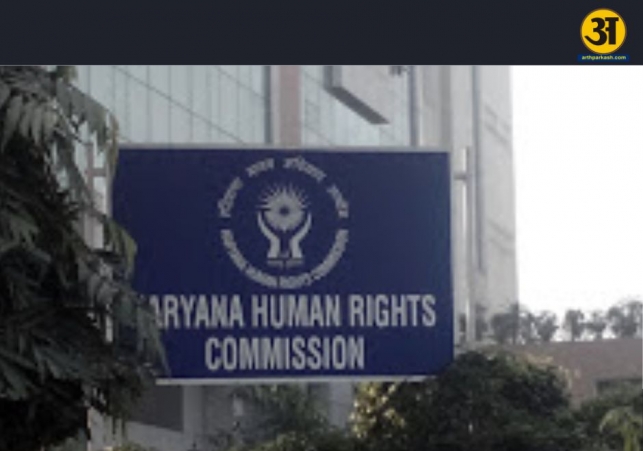
Panel supports transgender teacher’s plea for school recognition in Haryana
Haryana human rights panel backs transgender educator’s effort to get school recognised
- By Gurmehar --
- Friday, 11 Apr, 2025
In a major step for equality and inclusion, the Haryana Human Rights Commission (HHRC) has supported a transgender teacher’s fight to get their school officially recognised. The Commission’s order was praised as a big move toward giving equal opportunities to all, especially those from the transgender community.
The transgender educator had started a school in Karnal back in 2014-15. The goal was to educate poor and underprivileged children. However, the school has not been recognised by the government yet, mainly because it does not meet the land size rule. The school is built on 800 square metres of land, while the new rules require 1,500 square metres.
The teacher had raised a complaint with the HHRC, saying that the school was being denied recognition only due to land issues. In response, the Commission studied the matter carefully and gave a detailed order in favour of the complainant.
The order, issued on April 2, was signed by HHRC Chairperson Justice Lalit Batra and members Kuldip Jain and Deep Bhatia. They explained that denying recognition based only on land size goes against the Transgender Persons (Protection of Rights) Act, 2019, and Article 14 of the Constitution of India, which promises equal rights to every citizen.
Focus on inclusion
The Commission said that the state government has a duty to help transgender people access education, jobs, and self-employment without facing discrimination. The order refers to an important Supreme Court case—NALSA v. Union of India—which recognised the rights of transgender persons in 2014. It also mentions a 2023 advisory by the National Human Rights Commission, which asked all state authorities to provide fair and equal chances to transgender people.
According to the HHRC, Section 14 of the 2019 Act clearly talks about helping transgender people with self-employment. This means the government must create schemes and programmes that help them earn a living, including allowing them to run schools or other businesses.
Section 22 of the same Act gives the government the right to make special rules and plans for the betterment of transgender people in areas such as education, employment, and social welfare. Using this section, the HHRC said that the Government of Haryana can give special relaxations in the rules to support schools run by transgender people.
The Commission noted that while the current Haryana School Education Rules (amended in 2021) require a minimum land area of 1,500 square metres for recognition, the government can make exceptions in special cases. In this case, because the school is doing important work for poor children and is run by a transgender person, it deserves to be recognised despite the land size issue.
The order also strongly suggested that the government take a practical and inclusive approach. Rather than sticking rigidly to rules, authorities should focus on the good work being done by the school and the aim behind its creation. Helping the school get recognised would show the government’s support for fairness, dignity, and progress.
The HHRC said that the Directorate of Elementary Education in Haryana must adopt a balanced attitude. It should not allow strict rules to block real efforts that are trying to help society. The Commission said this is a chance for the government to prove that it supports inclusion and wants to build a fair society for everyone.
The order said, “Recognising the complainant's school would be a step towards justice and an affirmation of the State's commitment to foster an inclusive and equitable society.”
ALSO READ: Haryana Chief Secretary aims to bridge gap between public and private education
ALSO READ: Grieving but Proud, IAF Pilot’s Family Bids Final Farewell in Haryana’s Rewari
Next steps and official response
Puneet Arora, the Protocol Officer at the HHRC, said on Thursday that a hearing on the matter will take place on May 2. The Commission has ordered senior officials, including the Additional Chief Secretary of School Education and the Director of Elementary Education, to be present at the hearing and provide a detailed report.
This case is being seen as more than just a school recognition issue. It represents the larger struggle of transgender people in India, who often face discrimination in many areas, including education and employment. The school is not only an educational centre for poor children but also a symbol of empowerment for the transgender community.
The HHRC’s order has been welcomed by activists and legal experts. They say it sets an example for other states and government departments. It shows that rules should not become barriers when genuine efforts are being made to help others, especially the marginalised.
The Commission’s support comes at a time when the transgender community continues to fight for equal space in society. Many transgender people still face rejection, poverty, and lack of education. In such a situation, a school run by a transgender person offering free or low-cost education to underprivileged children is a strong example of change.
The HHRC’s use of laws, past court decisions, and human rights guidelines shows how legal tools can be used to bring about social justice. By highlighting Section 14 and Section 22 of the Transgender Persons Act, 2019, the Commission has made it clear that the government has both the power and duty to support such efforts.
Bringing change through education
The transgender educator’s school in Karnal started over a decade ago with the goal of giving poor children access to education. Despite the lack of formal recognition, the school has continued its work. The recent order gives hope that schools like this can get the official support they need.
The school’s founder has not only been a teacher but also a role model for many. Their journey from fighting discrimination to building an educational space shows how much one person can do with courage and determination.
This order by the HHRC is likely to boost the morale of the transgender community. It gives a strong message that government institutions are ready to support their dreams if those dreams serve the wider good.
The decision also urges policymakers to rethink existing rules and make them more inclusive. If a rule prevents a good project from moving forward, then perhaps it’s time to change that rule or make space for exceptions.
The Commission’s message is clear: inclusion matters, and those trying to bring about positive change must be supported, not discouraged.
With the upcoming hearing on May 2, all eyes are now on the Haryana government. If they accept the Commission’s suggestions and grant recognition to the school, it could become a landmark moment not only for this one educator but also for many others across the country who face similar challenges.
This development is a reminder that social progress often begins with small steps — and that recognising and supporting these steps can lead to a better, fairer society for everyone.





